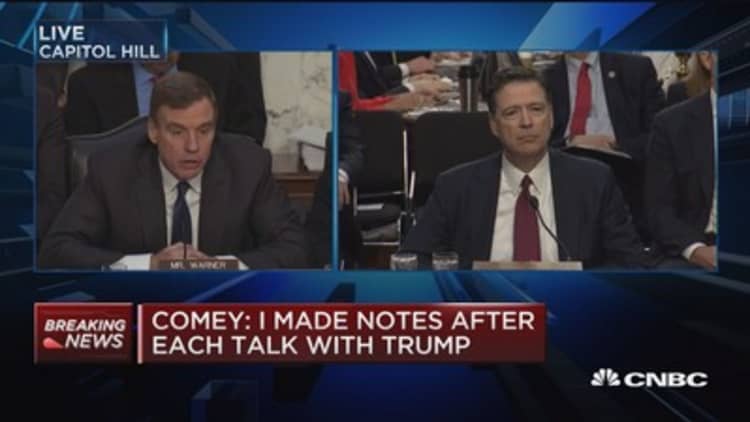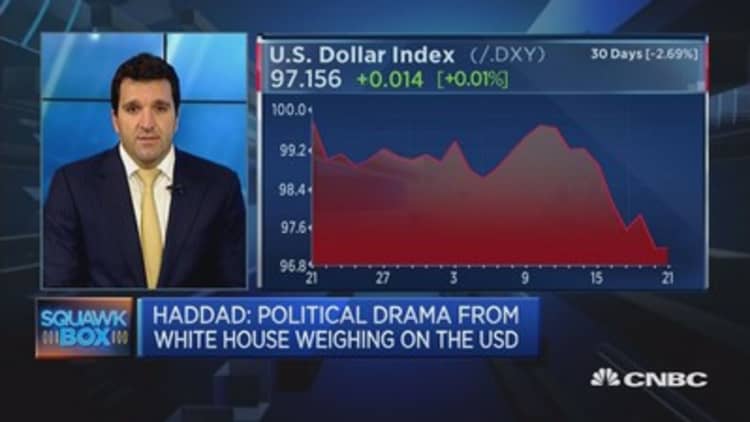
President Donald Trump has lurched from self-created crisis to crisis, and his approval rating languishes in the latest polls between 35 percent and 40 percent, the lowest of any newly elected president since Gallup begin measuring it.
On Thursday, former FBI Director James Comey is providing testimony before the Senate on the circumstances surrounding his firing and allegations Trump tried to pressure him to lay off the Russia investigation. Right off the bat, Comey said the Trump administration made "lies plain and simple" about him and the FBI, and defamed both. Comey also said he kept records on Trump meetings because he thought the president might "lie" and he said conversations with the president were "disturbing." The former FBI chief said Trump wanted him to "drop" the Michael Flynn-Russia investigation, but he was not ordered to do so and Comey told the Senate it's not for him to determine obstruction of justice.
When the written Comey testimony was released on Wednesday, the markets seemed to take it in stride rather than reacting as if there were a "smoking gun." On Thursday, as Comey's testimony played out, the markets moved from being flat early to up modestly at mid-day with the Dow at a record level.
Ever since the former FBI director's firing, Wall Street has been ever so gingerly — with the caveat that the odds are long but it can't be entirely ruled out — asking the question, Would a President Mike Pence be any better for the economy and for markets?
For now, hopes of Pence moving up to the Oval Office — whether those hopes are held by Republicans or Democrats — are mostly wishful thinking.
There's no sign President Trump wants to step down — in fact, his gut instinct, and that of his chief strategist Steve Bannon, is always to fight. He is allowing Comey to provide testimony instead of trying to block the former FBI director by citing executive privilege, an option that he had. As president, Trump also had the power to fire Comey, for any reason. It was an outcome many Democrats had been pushing for — before it was Trump doing it. Comey told the Senate he believes that he was fired because of the Russia investigation.
He named his pick for a new FBI director on Wednesday morning. And inquiries into Trump's 2016 campaign's dealings with Russia are at an early stage, making it unlikely that he would be impeached any time soon, even if Democrats won enough House seats next year to control the chamber and provide the majority needed for impeachment.
But it's not so unlikely as to not be worth exploring. A poll by Democratic pollster Public Policy Polling found 48 percent of Americans favor impeaching Trump. A Washington Post column by influential insider David Ignatius called next year's congressional election "The Impeachment Election."
On prediction trading site PredictIt, 23 percent of bettors think Trump will not be president at the end of 2017, while 18 percent think he will be impeached in 2017.
"People are definitely talking impeachment," said Sam Stovall, chief investment strategist at CFRA Research. "They're saying it would be better to get Trump out of the way. Pence is very much like Trump on issues about business and very different in terms of being able to get things done in Washington.''
More from ETF Strategist:
10 years after crisis, does booming mortgage market deserve more fans?
Elon Musk's energy agenda has been doing fine under Trump
The market rally has never been only about Trump
A review of the vice president's record suggests that President Pence's agenda would probably look more like that of a President Paul Ryan, now the GOP Speaker of the House, than like President Trump's. Trump's emphasis on dealmaking, which often causes him at least to flirt with ideological heterodoxy, would give way to more standard-issue GOP policies centered around libertarian-influenced deregulation and tax cutting.
People are definitely talking impeachment. They're saying it would be better to get Trump out of the way. Pence is very much like Trump on issues about business and very different in terms of being able to get things done in Washington.Sam Stovallchief investment strategist at CFRA Research
The part of Trumpism that Pence would likely keep — tax cuts, and a push for deregulation that includes repeal of the 2010 Dodd-Frank financial reform law and the Affordable Care Act, known as Obamacare — is the part most closely associated with the post-election stock market rally for which Trump's agenda deserves at least some of the credit.
ETFs in month since Comey firing
| ETF | Ticker | 1-month return |
|---|---|---|
| SPDR S&P 500 | SPY | 1.65 percent |
| SPDR Dow | DIA | 0.90 percent |
| Fidelity Nasdaq Comp. | ONEQ | 3.19 percent |
| iShares Russell 2000 | IWM | (-0.32 percent) |
Source: Google Finance
In Congress, Tea Party caucus member Pence voted against Dodd-Frank and also against the bank and auto bailouts that were another big part of the response by both President George W. Bush and his successor, President Barack Obama, to the 2008 financial crisis. He voted for legislation favored by very conservative skeptics of easy money to audit the Federal Reserve; for a bankruptcy-reform bill favored by credit card companies that made it harder for consumers to discharge debt; and against efforts to let homeowners reduce their mortgage principal through bankruptcy proceedings.
And he voted against Obamacare and pushed to repeal it dozens of times. As governor, though, Indiana accepted the law's Medicaid expansion, which Trump wants to defund.
That kind of voting record is consistent with the advisors Pence has surrounded himself with, said Jared Bernstein, top economic advisor to Vice President Joe Biden from 2009 to 2011 and now a senior fellow at the Center for Budget and Policy Priorities. Pence chose libertarian economist Mark Calabria of the Cato Institute for Bernstein's old job.
"I think of Vice President Pence as being for standard-issue conservative economic policies, including tax cuts in the spirit of Ryan/Trump, smaller government, spending cuts everywhere, including entitlements, except defense, " Bernstein said. "On health care, however, he was one of a minority of [GOP] governors who took the ACA Medicaid expansion in his state, so that cuts against type a bit." He did, however, implement stricter eligibility standards as well as a requirement that Medicaid-expansion recipients, who make no more than 138 percent of the poverty line threshold, contribute to Health Savings Accounts.
The part of Trumpism that Pence would most likely abandon is Trump's skepticism about free trade, the part of the President's doctrine that economists had considered most likely to cause an economic slowdown or even a recession, said Mark Zandi, chief economist at Moody's Analytics. Pence voted in favor of every major trade deal put before him, including the North American Free Trade Agreement, or NAFTA. Those votes were consistent with Indiana's economy, which is heavily dependent on auto-parts manufacturing, including parts exported to auto-assembly plants in Mexico.
"If you look at Indiana's economy, it makes sense that Pence would develop a pro-trade stance," Zandi said. "Slightly more than half of the state's metro areas have exports accounting for more than 10 percent of gross metro product. Moreover, Indiana's automotive industry, which helped power the state's strong recovery after the Great Recession, relies on a seamless North American supply chain, provided for under NAFTA. Therefore, I assume that he would hesitate to create any NAFTA-related uncertainty, based on his experience in Indiana."

There is little evidence in Pence's voting record in Congress, or in how he ran Indiana as governor, that he would favor a major program to rapidly build infrastructure, like roads and airports. Critics said Pence made a major proposal on infrastructure as governor only after a bridge on Interstate 65 in Indianapolis had to be closed for emergency repairs. Even then, the version that passed only authorized a fraction of the $1 billion of spending Pence called for.
All this is just hypothetical for now, says CFRA strategist Lindsey Bell.
"We don't see it as a highly likely event, but it's an interesting what-if, that's for sure," said Bell. "Crazier things have happened in the past year.''
—By Tim Mullaney, special to CNBC.com
Story has been updated to include comments from former FBI chief James Comey during Senate testimony.





